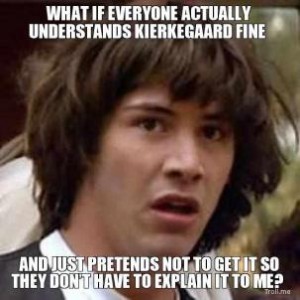Redemption and Adler
Alfred Adler is very interesting man with a set of attention-grabbing theories. Adler started the psychoanalytic move alongside Freud. Although he did help found this movement, Adler rejected Freud’s emphasis on sex and kept with the theory that personality difficulties are rooted in inferiority. Adler’s two contributions that I am going to talk about are fictional finalism and his personality theory.
Fictional finalism was very new to psychology when he first wrote about it. The theory states that there are future fictional goals to which a person aspires. The goals are usually he end to which the person is aspiring. These are also called the self-ideal and the guiding fiction. The second theory that Adler brought to psychology was that the human personality could be explained teleologically. He argued that parts of the individual’s unconscious self ideally work to convert feelings of inferiority to superiority, or completeness.
I believe that these two theories have the ability to place human nature into the Redemption category. Individuals are considered to have their own incomparable life. Adler believed that each person is their own individual being and should be treated as such. The way Adler talks about a persons experience seems to be congruent with the ideas of Redemption.


Kasey Morgan on Jean-Jacques Rousseau and the Fall
10:26 pm, 10.21.13
I can definitely see where you are coming from with him! I had a hard time putting him into a category as well. The Fall is where I can see him the most. His theories and ideas about how people are made bad by society is so interesting to me. I think that he really can speak into our culture today with the way social media and reality television portray human nature.
Kasey Morgan on Creation – Understanding the Human
10:21 pm, 10.21.13
I really enjoyed your post! I can definitely see the connection between Weber and Creation. I really like what you said about sensations and judgements. Your statement about going from abstract assumptions to actually understanding the human body. I think you were very insightful in this post!
Kasey Morgan on Man as Machine? Animal?
3:46 pm, 10.06.13
That is one of my favorite movies! I love the connection you made with his ideas. I think it is very hard to determine what theories fit into which categories sometimes. They can be right on the line of two, which in this case, I think you did a great job of trying to unravel that!
Kasey Morgan on Edmund Husserl and Creation
3:40 pm, 10.06.13
I think you did a great job trying to unravel all of the ideas of Husserl; he is a very complex writer. The idea that our mental acts are directed at something outside of ourselves because they are derived outside ourselves is one of the most interesting things I have read about this time around. I keep trying to make sense of God creating us, so he is outside of us, and he dwells in us. I think it is difficult to try and say if God is one or the other.
Kasey Morgan on Kant Can't
3:34 pm, 10.06.13
Your way of thinking about Kant is very interesting! I originally was in the same thought of mind about Kant under the fall. Your way of thinking about putting under restoration really makes me think twice about that. His ideas about people’s freedom is really what makes me question his categorization. I really like your train of thought!
Kasey Morgan on Luther and the Fall
7:57 am, 09.24.13
I think Luther is also an interesting character from our book. He looks on humans almost with disdain, which I find ironic. The idea that man could even come close to living a perfect life is something that everyone struggles with. Obviously we cannot make that happen for us. The fact that Luther believes that there is no redemption except ourselves almost gives this hope for man. He is almost saying that some of us CAN be perfect. Then everyone realizes that you can’t. Only Jesus is. I wonder if Luther thought his life was perfect enough to get into heaven?
Kasey Morgan on Bound and Broken
7:53 am, 09.24.13
Love your post! You thought through this very well. I love your idea of motivation. Motivation in our world can be something so dark and dangerous, and that could lead to darkness in man instead of the way God designed him. Then that comes back to God creating us in His image and I love that you made that connection! Good ideas!
Kasey Morgan on Heraclitus and Creation
10:13 pm, 09.09.13
I love his idea of the river. I completely agree with the idea of Creation as well. I think your thoughts about the world being in a constant state of flux is so true. I love the thought “God who is never finished working on the world He is creating.” I think Heraclitus really speaks into our faith and the creating God that we see in the Bible.
Kasey Morgan on Pythagoras and Creation
10:07 pm, 09.09.13
I think this is very interesting. I have a hard time relating to the ideas of the Pythagoreans because math has never really been “the answer” for me. I don’t really connect with the idea that math and numbers decode the entire universe. I have a hard time agreeing with him, but I like that you put him under creation.
Kasey Morgan on Plato, Creation, and The Fall
10:01 pm, 09.09.13
I hadn’t thought of Plato’s ideas that way. I really like the idea of being created and then being a state of “becoming”. Obviously Plato didn’t believe in the Christian God, but I think that this idea really relates to our faith. If we don’t let our faith become a living entity, we just become beings in a world that keeps moving around us.